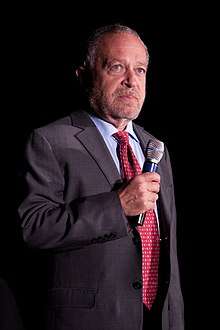
Robert Reich University of Iowa Sep 7 2011
Robert Bernard Reich (born June 24, 1946) is an American political economist, professor, author, political commentator, and was the 22nd Secretary of Labor from 1993 to 1997. Reich has been the Chancellor's Professor of Public Policy at the Goldman School of Public Policy at UC Berkeley since January 2006.]]
Quotes
- If nothing is done to counter present trends, the major fault line in American politics will no longer be between Democrats and Republicans, liberals and conservatives. It will be between the 'establishment'—political insiders, power brokers, the heads of American business, Wall Street, and the mainstream media—and an increasingly mad-as-hell populace determined to 'take back America' from them.
- Aftershock: The Next Economy and America's Future, Reich, Knopf Doubleday Publishing Group (2010), p. 145
- The U.S. economy crashes when it becomes too top heavy because the economy depends on consumer spending to keep it going... For a time, the middle class and poor can keep the economy going nonetheless by borrowing. But, as in 1929 and 2008, debt bubbles eventually burst. We're getting dangerously close. By the first quarter of this year, household debt was at an all-time high of $13.2 trillion.
- Almost 80 percent of Americans are now living paycheck to paycheck.... 40 percent of Americans said they wouldn't be able to pay their bills if faced with a $400 emergency. The underlying problem isn't that Americans have been living beyond their means. It's that their means haven't been keeping up with the growing economy. Most gains have gone to the top...
- Trump and his Republican enablers are now reversing regulations put in place to stop Wall Street's excessively risky lending. But Trump's real contributions to the next crash are his sabotage of the Affordable Care Act, rollback of overtime pay, burdens on labor organizing, tax reductions for corporations and the wealthy but not for most workers, cuts in programs for the poor, and proposed cuts in Medicare and Medicaid—all of which put more stress on the paychecks of most Americans.
- We Might Be Heading For A Crash As Bad As 1929, Newsweek , 4 September 2018
- Amid the coronavirus outbreak and financial crisis, older voters are backing Biden. He may be boring but at least he’s familiar and safe.
Since 24 February, with the lethal coronavirus spreading around the world, middle-aged and older Americans – not only most vulnerable to the disease but also accounting for most retirement savings – have been fleeing stocks for the relative safety of US government bonds.
- The coronavirus has starkly revealed what most of us already knew: The concentration of wealth in America has created a health care system in which the wealthy can buy care others can’t. It’s also created an education system in which the super-rich can buy admission to college for their children, a political system in which they can buy Congress and the presidency, and a justice system in which they can buy their way out of jail... The system is rigged. But we can fix it... The great divide in American politics isn’t between right and left. The underlying contest is between a small minority who have gained power over the system, and the vast majority who have little or none. Forget politics as you’ve come to see it – as contests between Democrats and Republicans. The real divide is between democracy and oligarchy....
- The System: Who Rigged It, How We Fix It, Alternet, 24 March 2020
- The oligarchy understands that a “divide-and-conquer” strategy gives them more room to get what they want without opposition... oligarchies cannot hold on to power forever... When a vast majority of people come to view an oligarchy as illegitimate and an obstacle to their wellbeing, oligarchies become vulnerable. As bad as it looks right now, the great strength of this country is our resilience. We bounce back. We have before. We will again. In order for real change to occur – in order to reverse the vicious cycle in which we now find ourselves – the locus of power in the system will have to change. The challenge we face is large and complex, but we are well suited for the fight ahead. Together, we will dismantle the oligarchy. Together, we will fix the system.
- The System: Who Rigged It, How We Fix It, Alternet, 24 March 2020
Saving Capitalism: For the Many, Not the Few (2015)
- Government doesn’t "intrude" on the "free market." It creates the market.
- Those who argue for "less government" area really arguing for a different government—often one that favors them or their patrons.
- The critical things to watch out for aren't the rare big events, such as the 2008 bailout of the Street itself, but the ongoing multitude of small rule changes that continuously alter the economic game. ... The "free market" is a myth that prevents us from examining these rule changes and asking whom they serve. The myth is therefore highly useful to those who do not wish such an examination to be undertaken.
External links
This article is issued from
Wikiquote.
The text is licensed under Creative
Commons - Attribution - Sharealike.
Additional terms may apply for the media files.